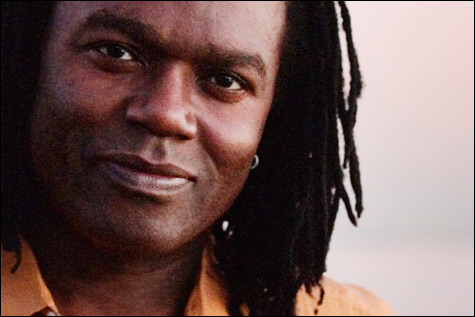
ROOTS MUSE: Ricardo Lemvo’s “mission” is to explore connections between Congolese and Cuban music. |
For the 32nd consecutive summer, the French Library’s Bastille Day Street Dance promises to be a world-music highlight. Haitian diva Emeline Michel returns, and Boston-based Senegalese percussionist Lamine Touré presents his Afro-mbalax band Group Saloum. The headliner, Ricardo Lemvo, is Congo-born, with Angolan roots and a deep connection with Afro-Cuban music, in part because he’s lived most of his life in Los Angeles. What these artists share is the French language, and the inheritance of intertwined cultural histories, a legacy they express in beautiful, complex, danceable music.
Senegalese percussionist Lamine Touré has made his home in Boston for years now, and anyone trawling the clubs where African pop bands play has likely caught his multi-genre dance band, Group Saloum. On the evidence of their bracing homonymous debut CD, Group Saloum merge funk, jazz, reggae, and more into the characteristic percussion-driven pop of Senegal, mbalax. Emeline Michel is a passionate modernizer of Haitian vodou roots, as she proved on her 2004 Rasin Kreyol (Times Square). She possesses an explosive singing voice, and her stage performance morphs soul review and cathartic ritual, mixing Haitian musical styles with reggae, gospel, and even Congolese dance pop.
On the new Isabela (Mopiato Music), Ricardo Lemvo and his band Makina Loca go back to what he calls his “root mission,” which is to explore connections between Congolese and Cuban music. “There’s nothing wrong with experimenting,” he says over the phone from LA, “but on recent albums, I believe I strayed from the mission.” Isabela finds him back in form, singing comfortably in Lingala, Kikongo, Portuguese, and Spanish, and working with Congolese legends: singers Nyboma and Wutu Mayi and guitarists Huit Kilos Nseka, Bopol Mansiamina, and especially Papa Noel, who Lemvo feels has never received his due. “When you talk about great Congolese guitarists, you talk about Franco and Dr. Nico. Papa Noel should be as popular as Franco. I cannot even compare him to the new generation of Congolese guitarists.”
Lemvo’s work is full of historic references. “Kasongo Boogaloo” features Huit Kilos playing a guitar solo borrowed from Dr. Nico, who first played it on the early-’60s African jazz hit “Kayi Kayi.” That song was itself an adaptation of a contemporary Cuban hit, but Nico’s solo takes its inspiration from yet another, “Seis lindas cubanas,” a celebration of Cuba’s six provinces that includes oblique references to the Cuban revolution and its famous black general, Maceo. These layers of influence are a deep delight, marrying montuno vamp, piano, percussion, brass, and distinctly Congolese guitar and vocals.
Lemvo reinvents the Franco classic “Malambo,” giving it a brassy, Cuban flavor and new lyrics in Portuguese and Kikongo. Why Portuguese? Well, that goes back to his Angola ancestry, which he elegantly expresses in his mix of soukous and the merengue-like Angolan kizomba style on “O casamento,” as well as on the slow, sensuous homage “Serenata angolana.”